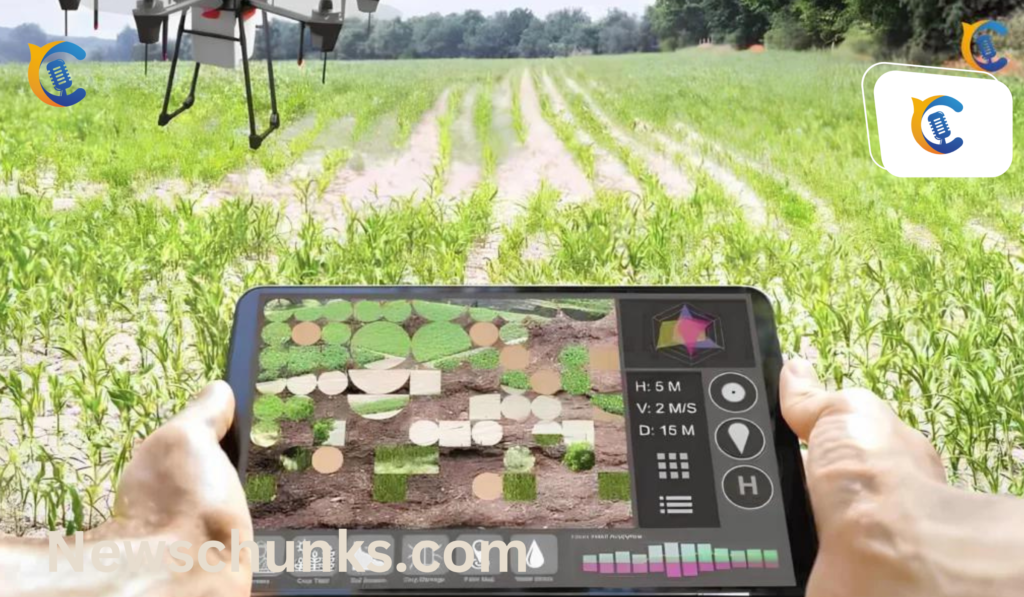AI in Agriculture: The Impact of AI on Farming Practices
Table of Contents
AI in Agriculture: Introduction
AI in Agriculture: In a world grappling with the challenge of feeding an ever-growing population, the intersection of technology and agriculture has never been more crucial. Enter Artificial Intelligence (AI), a powerful tool that is transforming the agricultural landscape. Through AI-powered precision agriculture technologies, farmers are harnessing data-driven insights to optimise crop yields, monitor soil health, and drive sustainable practises. In this blog post, we’ll explore how AI is reshaping the field of agriculture, enhancing productivity, sustainability, and the global food supply.
AI-Powered Precision Agriculture: A Paradigm Shift
Precision agriculture refers to the practise of utilising advanced technologies to gather data, analyse it, and implement targeted actions for enhanced agricultural production. AI has propelled precision agriculture to new heights, allowing for real-time decision-making based on a wealth of data points.
AI in Agriculture: Agriculture of Applications
- Crop Monitoring and Disease Detection: AI-driven sensors and drones monitor crops for signs of stress, disease, or nutrient deficiencies. This early detection enables farmers to take proactive measures, minimising crop losses.
- Predictive Analytics: Machine learning algorithms analyse historical and current data to predict crop diseases, weather patterns, and optimal planting times, leading to more informed decisions.
- Soil Health Assessment: AI analyses soil data to determine nutrient levels, pH, and moisture content, helping farmers optimise fertilisation and irrigation strategies.
- Automated Irrigation: AI-powered irrigation systems adjust water usage based on real-time weather data, reducing waste and promoting water conservation.
- Weed and Pest Management: Computer vision and AI algorithms identify and classify weeds and pests, enabling targeted interventions and reducing the need for excessive chemical use.
- Autonomous Farming Machinery: AI-driven autonomous tractors and harvesters operate with precision, minimising human error and optimising resource utilisation.
Advantages of AI in Agriculture
- Enhanced Efficiency: AI-powered tools optimise resource allocation, reducing wasteful use of water, fertilisers, and pesticides.
- Improved Yields: Data-driven insights enable farmers to make informed decisions, leading to increased crop yields and better-quality production.
- Sustainability: AI-driven practises promote sustainable farming by minimising environmental impact and reducing the use of chemicals.
- Cost Savings: Efficient resource utilisation and optimised practises translate to cost savings for farmers.
- Real-Time Decision-Making: AI enables farmers to make timely decisions, responding promptly to changing conditions and potential challenges.
AI: Challenges and Considerations
- Data Privacy: The collection of sensitive agricultural data raises concerns about data privacy and ownership.
- Access and Affordability: Smaller farmers may face challenges in adopting AI technologies due to cost and accessibility.
- Skill Gap: Implementing AI requires specialised knowledge, and training farmers to effectively use these technologies is crucial.
- Ethical and Social Implications: The impact of AI on traditional farming practises and rural economies needs to be carefully considered.
The Road Ahead: Nurturing the AI-Agriculture Nexus
As the symbiotic relationship between AI and agriculture continues to flourish, the path ahead is filled with opportunities for innovation, growth, and positive impact. To fully realise the potential of AI-powered precision agriculture, certain key aspects need to be addressed and nurtured.
1. Data Integration and Interoperability: To harness the full potential of AI, it’s essential to establish systems that allow different data sources, platforms, and technologies to seamlessly interact. This integration facilitates holistic decision-making for farmers and prevents data silos.
2. Education and Training: Bridging the knowledge gap is vital. Training programmes and resources should be made available to empower farmers with the skills needed to adopt and effectively use AI technologies.
3. Collaboration and Partnerships: The synergy between technology companies, agricultural experts, governments, and research institutions is crucial. Collaborative efforts can drive the development of AI solutions tailored to specific regional and agricultural needs.
4. Accessibility and Affordability: Ensuring that AI-powered tools are accessible to farmers of all sizes is imperative. Initiatives to make technology affordable and available to smallholders can lead to more equitable agricultural practises.
5. Ethical and Regulatory Frameworks: As AI increasingly influences the agricultural landscape, establishing ethical guidelines and regulations to address concerns like data privacy, algorithm transparency, and socio-economic impact is essential.
6. Research and Innovation: Continued investment in research and innovation will yield advancements in AI algorithms, hardware, and sensor technologies, further enhancing their application in agriculture.
AI: in agriculture key facts
- AI boosts crop yields through precision farming techniques.
- Soil health is monitored with AI for enhanced productivity.
- Data-driven insights from AI aid sustainable practices.
- Precision agriculture reduces resource waste.
- AI enhances decision-making for farmers.
- Sustainability was improved via AI-powered strategies.
- Crop monitoring becomes efficient and accurate.
- AI minimises the environmental impact of agriculture.
- Farmers gain actionable data for better results.
- Productivity soars with AI-driven advancements.
AI in Agriculture: Conclusion
The integration of AI in agriculture marks a transformative shift that aligns with the global need for sustainable and efficient food production. By harnessing the power of precision agriculture technologies, farmers are optimising crop yields, conserving resources, and driving innovation in the field. As AI continues to advance, it holds the potential to revolutionise traditional farming practises and shape a more sustainable and food-secure future. With careful consideration of challenges and a commitment to equitable access, AI-driven agriculture can significantly contribute to addressing the global food challenge while safeguarding our environment and fostering economic growth in rural communities. The seeds of innovation have been sown, and the harvest of a more efficient, sustainable, and bountiful agricultural sector is within reach. Click Here
- Arsenal team formation 2023: A Comprehensive Overview 2023
- Greece’s Epic Fight Against Devastating Wildfires
- NASA Shares First Images of US Pollution
- AIRCRAFT CRASHES IN AUSTRALIA’S NORTHERN TERRITORY DURING US MILITARY TRAINING EXERCISE
- Further Insights into the Top 20 US Cities with Highest Internet Usage
